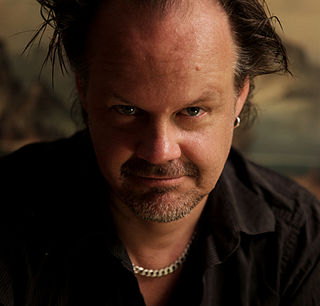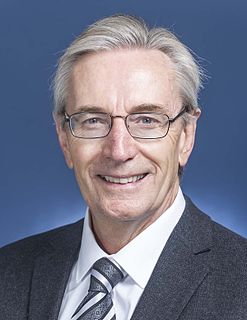Top 440 Obsessive Quotes & Sayings - Page 8
Explore popular Obsessive quotes.
Last updated on December 4, 2024.
It's a very obsessive profession that you need to stay obsessed to get anywhere, and it's very easy for us to get obsessed and then nothing else matters. I was reading Somerset Maugham's novella, Moon and Sixpense, about this artist based on Gauguin's life. It was so beautifully written. You must be first rate because second rate you might not survive. If you're an accountant, you'll survive second rate. If you chance it big, you may not get anywhere.
Notice that whenever we suffer pain, the mind is always quick to identify with the negative aspects of things and replay them over and over again, wounding us deeply. Almost all humans have Obsessive Compulsive Disorder (OCD) of the mind, which is why so many people become fearful, hate-filled, and wrapped around their negative commentaries. This pattern must be recognized early and definitively. Peace of mind is actually an oxymoron. When you're in your mind, you're hardly ever at peace, and when you're at peace, you're never only in your mind.
Once I do something, I need to be obsessed - or maybe I don't need to be obsessed, but I get obsessed because that's just the way my brain works - but I need to pay a lot of attention to detail. Because everything counts to me once I do something, even if it's a movie that nobody cares about. That's why I need to choose very well what I want to do. But in real life, when I watch TV or whatever, I guess I'm not that obsessive guy, and I'm pretty boring.
I'm pretty obsessive-compulsive and I'm very fast. I tend to not write for a long period of time until I can't not write, and then I write first drafts in gallops. I won't eat right. I forget to do my laundry. I have a dog now, and I have to remember to walk him. When I write, that takes over and I can't do anything else. There's something exciting about that free fall, but then my life gets really screwed up. I've lost lots of relationships because of my having to ignore everything.
I was asked by the National Institute of Health to be their scientific discussant on the effects of these drug [Ritalin] at a big conference they held. Beforehand, I reviewed all of the important literature on the issue. Even with experiments on animals. When they're given these drugs they stop playing; they stop being curious; they stop socializing; they stop trying to escape. We make good caged animals with these drugs. And we make good caged kids by knocking their spontaneity out of them. And, Michael, the other thing is that these drugs enforce obsessive behavior.
The obsessive focus on a college degree has served neither taxpayers nor students well. Only 35 percent of students starting a four-year degree program will graduate within four years, and less than 60 percent will graduate within six years. Students who haven't graduated within six years probably never will.
The ways in which acquired savants show up are usually the same ways that congenital, or non-acquired, savant syndrome shows up. They tend to show up in the same areas: music, art, math, visual, spatial skills, and calendar calculating, although calendar calculating probably isn't quite as prominent in that group. They tend to show up quite quickly, or sort of explode on the scene and they then tend to have an obsessive sort of forceful quality about them in the same way as savant skills. So they tend to show up in the same ways.
Our mother always taught us to be in control of our voice and our bodies and our work, and she showed us that through her example. If she conjured up an idea, there was not one element of that idea that she was not going to have her hand in. She was not going to hand that over to someone. And I think it's been an interesting thing to navigate, especially watching you do the same in all aspects of your work: Society labels that a control freak, an obsessive woman, or someone who has an inability to trust her team or to empower other people to do the work, which is completely untrue.
I always loved horror as a kid. On the one hand, I really love monsters, because in a way I feel like I related to their outsider status and like the sentimental romantic plight of the monster. More importantly though I feel like people are completely motivated by fear, especially with our political system here in America which is just degenerating into more and more fear mongering and it gets in the way of real discourse, plus it's just something I'm obsessive about and have always been a little bit of a paranoid guy.
I must say that when I first learned of the existence of the Australian Greenhouse Office, I assumed it was responsible for supplying tomatoes to the Parliament House kitchen. But, no, as I soon learnt as industry minister, it was in fact a government funded redoubt of veritable soldiers in a war against carbon dioxide. The zealotry and obsessive passion of these warriors in the battle against the apparent evils of carbon dioxide remains a curiosity to me. After fighting these people for three years as industry minister, I really did wish they would just go away and grow tomatoes.
Some street jokes are just timeless. There's an old street joke about comedians. The joke is that a beautiful girl comes up to a comedian at the end of the night and says, "I saw your show tonight, and I just loved it. I want to go home with you, and I'll do anything you want." And the comedian says, "Were you at the 7 or the 9?" That's just a perfect joke, because it points out how egomaniacal and obsessive comedians are. Even though I'm not waiting for a groupie, I can completely understand it. It just defines how comedians are driven.
People always ask us women about how we balance our lives. Rarely do they ever ask men this but we are asked this and it makes a lot of sense - balance, right? It sounds right. And of course you do have to balance because otherwise you'd go crazy. And you do have to find ways of doing things in a sensible manner, raising children and all those choices. But then there's a part of creativity which is irrational and which is obsessive and then that's also part of what we do. So, I don't think that's a bad thing. I think that's part of what makes someone good.
I was pretty self-conscious about my body because everybody kept going on like, "Oh, she's so curvy!" and "She's a plus-size model!" and this and that. It's all people would talk about - how I'm not very skinny. For a while, it made me pretty upset and I got a bit obsessive about it. I did a bunch of dieting and exercising and everything. I was losing weight, but I was still much bigger than everybody else. I didn't really see the point of making myself crazy anymore, so I kind of toned it down a little bit.
Insomnia is a variant of Tourette's--the waking brain races, sampling the world after the world has turned away, touching it everywhere, refusing to settle, to join the collective nod. The insomniac brain is a sort of conspiracy theorist as well, believing too much in its own paranoiac importance--as though if it were to blink, then doze, the world might be overrun by some encroaching calamity, which its obsessive musings are somehow fending off.
My role relationship to the event will continue to mutate. My relationship to my mother will continue to change as I revise my judgments of her depending on what I learn about her. It goes on. But I feel no less obsessive about my work and no less passionately committed to the life I have now, but I feel poised inside. Which is a good thing to feel at 48.
Perfectionism is the voice of the oppressor, the enemy of the people. It will keep you cramped and insane your whole life, and it is the main obstacle between you and a shitty first draft. I think perfectionism is based on the obsessive belief that if you run carefully enough, hitting each stepping-stone just right, you won't have to die. The truth is that you will die anyway and that a lot of people who aren't even looking at their feet are going to do a whole lot better than you, and have a lot more fun while they're doing it.
Every first-rate editor I have ever heard of reads, edits and rewrites every word that goes into his publication.... Good editors are not 'permissive'; they do not let their colleagues do 'their thing'; they make sure that everybody does the 'paper's thing.' A good, let alone a great editor is an obsessive autocrat with a whim of iron, who rewrites and rewrites, cuts and slashes, until every piece is exactly the way he thinks it should have been done.
If you would like to write better than everybody else, you have to want to write better than everybody else. You must take an obsessive pride in the smallest details of your craft. And you must be willing to defend what you've written against the various middlemen - editors, agents and publishers - whose sights may be different from yours, whose standards not so high.
I suppose I could read more fiction, but I haven't moved in that direction. I'd like more time even though I spend six hours a day reading. People say their eyes get tired, but I've never experienced that. In college I used to read 10 hours a day. My wife says I'm obsessive compulsive. She might have a point because when I was an undergrad student we had the required reading list and the suggested reading list. I always read all the suggested reading too.
If the book is finished—published and on the shelf—I do not think of revising it. But if I'm not finished psychologically with characters, they will recur, either as themselves or as new, slightly altered manifestations, and their same issues will reappear. It's a matter of the subject and emotional investment and my own obsessive thinking about various issues It's an unconscious process. To say that a single story is not done isn't quite true. A story can be finished and judged successful or not by somebody else, but if the issue is not done for me, I can count on its reappearance.



















